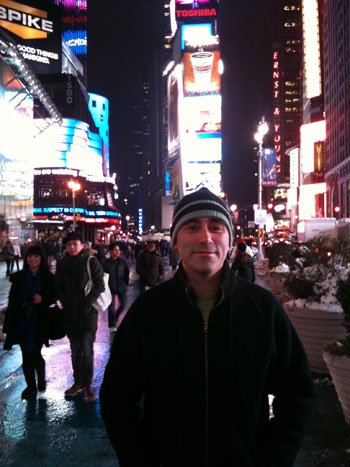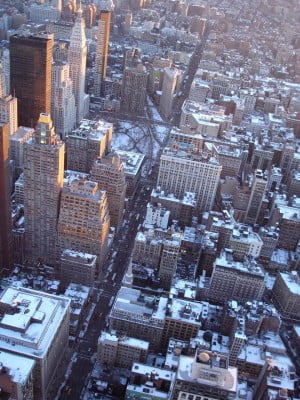50 in New York

Something I’ve rabbited on about before is how the world is homogenising – the more I travel, the more it seems to me that everywhere is becoming the same. If this is even true for Sri Lanka, then how much more so is it for travelling between the UK and New York?
But before I go into that (I think this is going to become quite a ramble, but hopefully you will forgive me, now that I am becoming so very aged *grin*), I would like to lay before you a rather brilliant observation made by the peerless historian Arnold Toynbee that seems to explain why globalization naturally leads to cultural homogenisation.
Toynbee points out that this has happened before: in the Neolithic a flint spear point in western Europe would be indistinguishable from one being made on the same day in China. This is because, at that time, whatever innovations in technique these spear points might incorporate, the rate of innovation in technology (and culture) was far slower than the rate at which news of it could be spread. Once this rate of innovation started speeding up to be faster than the rate of spread, then regional cultures started emerging – the innovations piling up locally faster than they could spread to other cultures. Thus China became very different from Europe. However, in the past hundred years or so the rate of spread has dramatically increased – even though the rate of innovation has also sped up. With the internet anything innovated anywhere can quickly become known to everyone everywhere. So, welcome to the New Neolithic! The Cyberlithic where our stone tools now consist of silicon chips *grin*)
New York is of course remarkable – though perhaps as much for its associations as for what it actually is. It has been for so long ‘the’ world city that we all of us think we know it. There are people everywhere who probably have seen more of New York (through Hollywood’s charmed eyes) than they have the capital of their own country.
I had never been there before, and so there was that strange shock of seeing in reality that which I had seen in so many other virtual ways. The relationship of one thing to another, the geography, the relative and absolute scales of things – these were all different from those I had arrived with in my head.
I did all the touristy things – it seems only polite on a first visit. It was particularly cold, more so even than in Scotland! so I’m not entirely sure I saw the city as it is typically. New York is impressive – how could it not be? Wonderfully cosmopolitan – though perhaps not more so than London with which I am familiar. It has the same range of treasure houses – the Metropolitan Museum, for example, and the glorious (and vainglorious) examples of architecture that wealth adorns cities with. For some reason I kept on thinking that this would be how Babylon might have appeared to an ancient visitor – but then Babylon is perhaps much on my mind. Perhaps what most distinguished it for me from a European city is some of its infrastructure: Paris would be embarrassed to have her bowels riddled by the New York subway. Though simply functional it lacks some of the civic care and elegance that would be lavished on it by a European capital. One surprise: I had expected natives to be rude – that’s the cliché – but they weren’t. In fact the New Yorkers I encountered were the friendliest people I have come across in any Western city.
It was my birthday that led me on this winter visit to New York. A 50th should probably be made a fuss of, but I couldn’t bear having anything organized at home. Too much pressure. Besides, I’m really rather shy about attention – not so attention for my work!! *grin* In one way 50 is just an arbitrary number – if we counted in base 12, then the significant birthdays would be 12, 24, 36, 48, 60… and I would still be in my early 40s *grin* Not that I am trying to deny that there is something significant in these time markers. Jung had an image of life as being like a single passage of the sun through the sky. We are born and then, for the first half of our lives, we ascend, growing ever brighter, seeing ever further. When we reach our midday that is as high as we go, as bright. Thereafter, we begin the slow fading to our sunset. No wonder then that so many of us have ‘mid-life’ crises. Clearly, psychically, something profound happens to us as we near the midday of our lives, and once we become aware of our inevitable decline. Jung maintained that the morning of our lives, though filled with struggle, is relatively straightforward. It is the afternoon that it is difficult to deal with. And the secret of a good life is how we handle that. I passed my midday a while back (however much our lifespans are lengthening) but I am still coming to terms with being in the afternoon of my life.
Showering before going to catch my flight home, I began thinking of the life I was returning to. It occurred to me how strange it was that I should be thinking nothing of the crossing of the Atlantic. This vast ocean that for so long kept the Old and New Worlds apart, the crossing of which had profound effects that we still are living through. Images crossed my mind of all the people to whom that crossing was one way – and a vast, frightening and dangerous undertaking. That I had mentally ‘skipped over it’ shows again just how virtual our world has become. In the West we so rarely exit the envelope of human reality that often the ‘actual’ world hardly seems to be there at all. And even as New York seemed to me not very different from London… soon it will not seem so different to Cairo, Nairobi, Shanghai… And yet, even if I rode the virtual teleport of my aeroplane back home (admittedly a rather tedious teleport lasting 6 hours), this did not mean that below me there was not thousands of kilometres of cold heaving ocean.


Hey, Ricardo Pinto. I am Ricardo Pinto born in Lisboa in 1961!!!
so this blog chain is almost 5 years ago…. I hope you are well and everything is great! 🙂
take care
and there was I thinking that I was unique! *grin* um grand abraço
PS I am Ricardo Mendes Pinto really – do you have other names?
Where are my comments?
I have to approve all comments before they appear on my blog… :O)
50 Ricardo. I can remember that.Two decades later and I am still going uphill. Life has been a marvelous learning curve. More to come for you.
New York impressed me too, the people mainly. Relaxed (at least the ones I met) Tho’ sometimes the seamier side of things glimpsed out. A black woman sheltering under a flight of exterior steps ,sipping a hot coffee. What was she waiting for.? Or who? A story there. Another woman walking doggedly behind a guy on 6th Street. So near BROADWAY.Eye contact. She was frightened. Another story.
I ramble. You are so right about homogenization. Me walking along Kensington High Street. (You know where that is) and a passer by asks me where Starbucks is. Scream. It’s horrible coffee (In my English/Canadian opinion.
But I am a sucker for multiculturalism. Toronto Canada taught me that. Humanity can live peacefully in one boiling pot. We must.
I was born in a bombing raid, I thought that when I grew up the grownups would have fixed everything As I said, I ramble. It’s a perk of being old.
Off to NYC myself in March and, heading down again in July.
Val H. Canada.
Take care.
you’re really 70?! You don’t look anything like that on your facebook picture… Multiculturalism is one of the glories of our age… Born in a bombing raid where?
Do you think that we move, as many sci-fi authors write, towards the deletion of that cold heavning ocean, or any other sort of ‘reality’, in a physical kind of way?
Glad your trip was a safe one.
Also, were we not, Portuguese, also quite nice? *grin* (I jest, I jest…)
I’m sure we would delete nature if we could… but I suspect that she will beat us to the draw – and delete us first *wry grin*
oops, the Portuguese – you’re right of course – just as friendly as the New Yorkers – I suppose when I was thinking of the West I was more focused on the more northern parts of Europe – the UK, of course, Germany, France – especially Paris!!! But, hey, I don’t have a clue what I’m talking about *grin* I’ve got a very limited experience of the ‘West’ – apart from having lived in a bit of it… It was one of my unjustified generalizations – the intention of which was simply to point out how friendly I found the New Yorkers – how much I enjoyed being among them… :O)
nice read
and i’ll chime with michael
have a good afternoon!
as for toynbee
interesting interpretation
but your conclusion is amiss…
the rate of innovation is ludicrously high in virtual ways
although there is some homogenisation
the rate of diversification in new forms is increasing…
i suspect more islands of sub-cultures
both seem to me likely to be true. I was talking about culture geographically becoming homogenised, specifically on the level of one urban setting becoming more and more like any other. Your point seems to me to address a different issue: that of sub-cultures arising in the human virtuality. This is true, as you say, however it strikes me that these ‘islands of sub-culture’ seem to me nothing more than bubbles in the seething that is produced by the heat of innovation…
I love it that we have the possibility today to get our lives more and more interwoven with people, locations abd cultures from all around the world. I think this is our chance to take civilization to a new step – a chance that is needed:
Getting to know each other better, understand other cultures by getting into contact with people from there in a mouse click – albeit only virtual at first, but to establish personal contact after that is always an option. And we would not have these possibilites without the virtual gateways and communication channels.
All of this hopefully will help us, on the long run, to grow together as a race, as humankind. Because this is what we need to do.
Have a good afternoon, Ricardo :-)!
~Michael
entirely agree with you… and what you say is entirely true for what I term the ‘human virtuality’ – our global (emerging?) civilization… However, one of the dominating themes on this blog is how that human virtuality is coming more and more unstuck from the underlying physical reality of our planet… and how, ultimately, whatever we manage to achieve in our virtuality, this could all be brought crashing down by the damage to its foundations: the living systems of the Earth – Gaia, if you will…